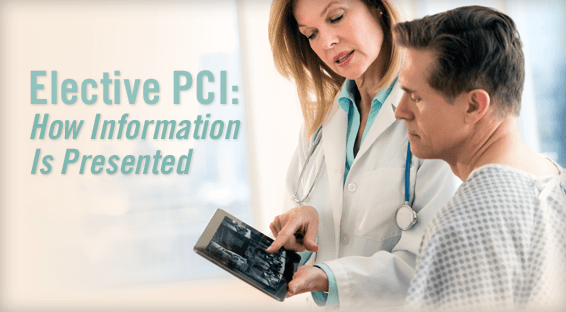For patients with stable coronary disease, studies have shown that PCI does not reduce the risk for death or myocardial infarction (MI), even when it is added to optimal medical therapy (OMT). “Studies of patients undergoing elective PCI demonstrate that most patients believe that the procedure will reduce their risk for MI or death,” explains Michael B. Rothberg, MD, MPH. “The reasons behind these beliefs are unknown.”
Examining Decisions
In JAMA Internal Medicine, Dr. Rothberg and colleagues had a study published that explored how the presentation of potential benefits and risks of PCI and OMT influences patients’ beliefs and decision making. Specifically, the analysis looked at the effect of information presentation on beliefs about PCI and willingness to choose it. In an online survey, more than 1,200 adults aged 50 and older were asked to imagine having experienced chest pain and being referred to a cardiologist. They were then randomized to one of three scenarios. In the first, patients received no information about the effects of PCI on MI. In the second, participants were told specifically that PCI will not reduce the risk for MI. In the third, patients were told why PCI does not reduce the risk for MI. Then they answered questions about the procedure and whether they would choose it.
Presenting factual information affected participants’ beliefs and decisions regarding PCI (Figure). “Over 70% of participants who received no information about whether PCI would prevent MI believed that the procedure would do so,” says Dr. Rothberg. “Simply stating that PCI would not prevent an MI reduced this percentage to 39%, and explaining why PCI would not prevent MI was even more effective.” These findings suggest that physicians should explicitly state that PCI will not prevent MI because patients may otherwise assume that it will.
Participants receiving no information were also the most likely to choose PCI. “Believing that PCI could prevent MI was the strongest predictor of participants choosing PCI,” Dr. Rothberg says. “Also, participants who received no information were least likely to agree to use medications while those receiving explanatory information were most likely. The impact was really striking given that it was limited to a few lines of text and that there was no opportunity to ask clarifying questions.”
Assessing Knowledge Recall
The research team also asked participants to recall what their physician said about the benefits of PCI. Only one in five patients receiving no information could correctly recall that the physician said nothing. However, about two-thirds of patients who received explicit or explanatory information remembered the physician saying there would be no reduction in risk of MI.
In addition, more than half of patients in the group with no information falsely remembered that their physician had told them that PCI would reduce their risk for an MI. Rates were much lower for patients in the other groups. Furthermore, about one-fifth of patients still believed that PCI would prevent an MI despite remembering the physician saying it would not. These findings illustrate that deeply ingrained patient beliefs may have an important impact.
Considering Implications
Several strategies have been proposed to improve patient understanding when deciding on PCI, including a standardized consent template and decision aids. These interventions are still being tested but may be helpful in the future. In addition, several factors may be at play. For example, not all patients’ misconceptions can be overcome easily. Cardiologists may also mistakenly believe they are successfully communicating with patients. Self-assessments of how these messages are being delivered could become an important quality improvement initiative in the future.
Dr. Rothberg points out that another important misconception is patients can choose between OMT and PCI to reduce their risk of MI. “OMT is recommended regardless of whether or not a patient receives a stent,” he says. “Communicating the benefits of PCI remains challenging for clinicians but is essential to fostering informed-decision making. Providing even small amounts of information to patients has the potential to affect their beliefs and decisions.” The study notes that this can be accomplished without requiring patients to watch lengthy videos or having physicians spend too much time with patients. In light of the findings, Dr. Rothberg recommends studies be undertaken to assess the effects of brief interventions on patient misconceptions regarding the benefits of elective PCI.



 Janine Anthes
Janine Anthes